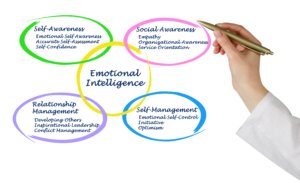Leadership Lesson – May 2024: Four Key Components of Emotional Intelligence Every Leader Should Know
Leadership Lesson
Words of advice from leaders on the front lines.
This month’s leadership lesson is from Julie Kueker, MBA, BS MT (ASCP), Alliant Health Solutions Program Director for Alabama, Florida and Louisiana.

A traditional definition of good leadership qualities only includes proficiency in technical skills. While that is part of the equation, effective leaders should also excel in emotional intelligence.
In a Harvard Business School article titled, “Why Emotional Intelligence is Important in Leadership”, emotional intelligence is defined as the ability to understand, manage, recognize and influence the emotions of those around you. According to the article, effective leaders have a high degree of emotional intelligence, and 71% of employers value this attribute more than technical skills when evaluating candidates.
Here are four key components of emotional intelligence:
- Self-awareness: The ability to recognize our own strengths and weaknesses.
- Self-management: The ability to maintain a positive outlook during stress, rather than react impulsively.
- Social awareness: The ability to recognize emotions in others and exhibit empathy.
- Relationship management: The ability to coach and mentor others.
We can take a few simple steps to increase our emotional intelligence. For instance, we can keep promises, show empathy, lift others up, admit to our own mistakes, and show gratitude. As leaders, we pave the way for our organization and our staff. Mastering emotional intelligence can lead to a lower turnover rate, higher job satisfaction, and a happier workplace that encourages the achievement of all established goals.
